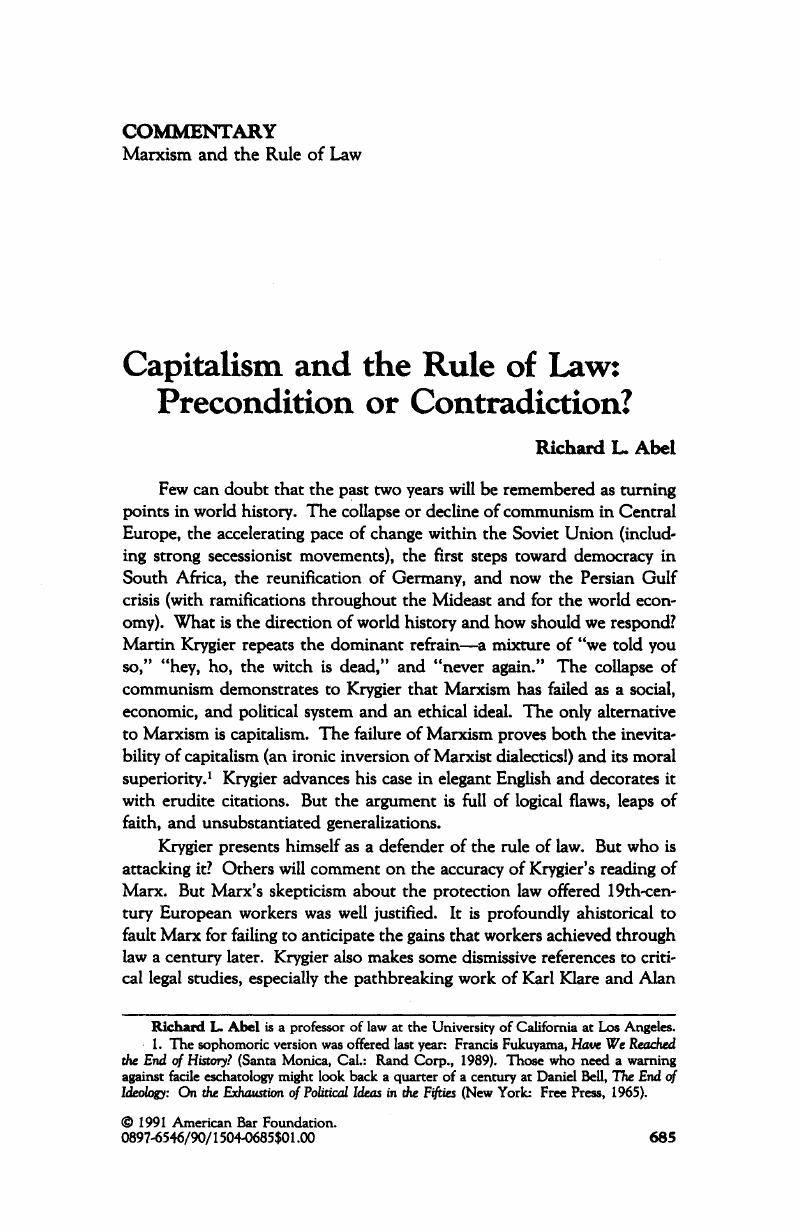Article contents
Capitalism and the Rule of Law: Precondition or Contradiction?
Published online by Cambridge University Press: 27 December 2018
Abstract

- Type
- Debate: Marxism and the Rule of Law
- Information
- Copyright
- Copyright © American Bar Foundation, 1990
References
1 The sophomoric version was offered last year: Francis Fukuyama, Have We Reached the End of History? (Santa Monica, Cal.: Rand Corp., 1989). Those who need a warning against facile eschatology might look back a quarter of a century at Daniel Bell, The End of Ideology: On the Exhaustion of Political Ideas in the Fifties (New York: Free Press, 1965).Google Scholar
2 Alan Freeman, “Legitimizing Racial Discrimination Through Antidiscrimination Law: A Critical Review of Supreme Court Doctrine,” 62 Minn. L Rev. 1049 (1978); Karl E. Klare, “Judicial Deradicalization of the Wagner Act and the Origins of Modern Legal Consciousness, 1937–1941,” 62 Minn. L. Rev. 265 (1978).Google Scholar
3 E.g., Kimberle Crenshaw, “Race, Reform, and Retrenchment in Antidiscrimination Law,” 101 Harv. L Rev. 1331 (1988); “A Black Feminist Critique of Antidiscrimination Law and Politics,” in David Kairys, ed., The Politics of Law (rev. ed. New York: Pantheon, 1990).CrossRefGoogle Scholar
4 E.g., Peter Gabel, “Reification in Legal Reasoning,” in Steven Spitzer, ed., 3 Research in L & Soc. (Greenwich, Conn.: JAI Press, 1981).Google Scholar
5 See W. G. Carson, “Symbolic and Instrumental Dimensions of Early Factory Legislation: A Case Study in the Social Origins of Criminal Law,” in Roger Hood, ed., Crime, Criminology, and Public Policy (London: Heinemann, 1974); W. G. Carson, “The Conventionalization of Early Factory Crime,” 7 Int'l J. Soc L. 37 (1979).Google Scholar
6 Stanley Cohen, Visions of Social Control: Crime, Punishment and Classification (Cambridge: Polity Press, 1985).Google Scholar
7 William Glaberson, “Shift to ‘Community Courts' Urged For Petty Crime in New York City,”N.Y. Times, 27 Sept. 1990, at A17.Google Scholar
8 N.Y. Times 30 Sept. 1990, at sec. 1, pt. 1, p. 3, col. 1.Google Scholar
9 Mari Matsuda, “Public Response to Racist Speech, Considering the Victim's Story,” 87 Mich. L R. 2320 (1989).CrossRefGoogle Scholar
10 Milovan Djilas, The New Class (San Diego, Cal.: Harcourt, Brace, Jovanovich, 1983).Google Scholar
11 C. Wright Mills, The Power Elite (New York: Oxford University Press, 1959).Google Scholar
12 David Sugarman, “In the Spirit of Weber: Law, Modernity, and ‘the Peculiarities of the English’“University of Wisconsin Institute of Legal Studies Working Paper 2–9 (Madison: Institute of Legal Studies, University of Wisconsin, 1987).Google Scholar
13 Krygier argues only that the two are “not unrelated.” This is as evasive as his claim that Marx's words are somehow responsible for the actions of those who later invoked him. Indeed, Krygier uses the double negative in both places: “not an outrageous step” (at 20), “not an unimportant [oversight]” (at 30).Google Scholar
14 N.Y. Times, 8 Oct. 1990, at A6.Google Scholar
15 U.S. Bureau of the Census, Statistical Abstract of the United States (Washington, D.C., 1990).Google Scholar
16 David Burnham, A Law Unto Itself: Power, Politics and the IRS (New York: Random House, 1989).Google Scholar
17 Dirk Johnson, “Milwaukee Creating 2 Schools Just for Black Boys,”N.Y. Times, 30 Sept. 1990, sec. 1, at 1.Google Scholar
18 Judith McGowan, “In the Bronx, A Dubious Victory,”N.Y. Times, 13 Oct. 1990, at 15.Google Scholar
19 Daniel H. Lowenstein, “Campaign Spending and Ballot Propositions: Recent Experience, Public Choice Theory, and the First Amendment,” 29 UCLA L Rev. 505 (1982).Google Scholar
20 Miles Corwin, “New Sleeping Ban Reawakens Dispute,”Los Angeles Times, 12 Oct. 1990, at A3.Google Scholar
21 Richard L Abel, “£'s of Cure, Ounces of Prevention,” 73 Cal. L Rev. 1003 (1985).CrossRefGoogle Scholar
22 Steven A. Holmes, “Bush Won't Back New Rights Bill,”N.Y. Times, 13 Oct. 1990 at 9.Google Scholar
23 Richard L. Abel, “Socializing the Legal Profession: Can Redistributing Lawyers' Services Achieve Social Justice?” 1 Law & Pol'y Q. 5 (1979).CrossRefGoogle Scholar
- 1
- Cited by


